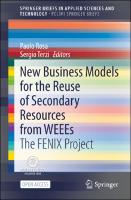New Business Models for the Reuse of Secondary Resources from WEEEs
The FENIX Project
| dc.contributor.editor | Rosa, Paolo | |
| dc.contributor.editor | Terzi, Sergio | |
| dc.date.accessioned | 2021-07-14T09:58:46Z | |
| dc.date.available | 2021-07-14T09:58:46Z | |
| dc.date.issued | 2021 | |
| dc.identifier | ONIX_20210714_9783030748869_23 | |
| dc.identifier | ONIX_20210714_9783030748869_23 | |
| dc.identifier | OCN: 1257796011 | |
| dc.identifier.uri | https://library.oapen.org/handle/20.500.12657/50044 | |
| dc.description.abstract | This open access book summarizes research being pursued within the FENIX project, funded by the EU community under the H2020 programme, the goal of which is to design a new product service paradigm able to promote innovative business models, to open added value to the vessels and to create new market segments. It experiments and validates its approach on three new concepts of added-value specialized vessels able to run requested services for several maritime sectors in the most effective, efficient, economic valuable and eco-friendly way. The three vessels share the same lean design methodology, IoT tools and HPC simulation strategy: a lean fact-based design model approach, which combines real operative data at sea with lean methodology, to support the development and implementation of the vessel concepts; IT customized tools to enable the acquisition, processing and usage of on board and local weather data, through an IoT platform, to provide business services to different stakeholders; HPC simulation, providing a virtual towing tank environment, for early vessel design improvement and testing. The book demonstrates that an integrated LCC analysis and LCC strategy to guarantee sustainability to vessels concepts and the proper environmental attention inside the maritime industry. | |
| dc.language | English | |
| dc.relation.ispartofseries | SpringerBriefs in Applied Sciences and Technology; PoliMI SpringerBriefs | |
| dc.subject.classification | thema EDItEUR::T Technology, Engineering, Agriculture, Industrial processes::TG Mechanical engineering and materials::TGP Production and industrial engineering | en_US |
| dc.subject.classification | thema EDItEUR::K Economics, Finance, Business and Management::KC Economics::KCV Economics of specific sectors::KCVG Environmental economics | en_US |
| dc.subject.classification | thema EDItEUR::K Economics, Finance, Business and Management::KJ Business and Management::KJM Management and management techniques::KJMV Management of specific areas::KJMV8 Purchasing and supply management | en_US |
| dc.subject.classification | thema EDItEUR::R Earth Sciences, Geography, Environment, Planning::RN The environment::RNH Waste management | en_US |
| dc.subject.other | Industrial and Production Engineering | |
| dc.subject.other | Natural Resource and Energy Economics | |
| dc.subject.other | Supply Chain Management | |
| dc.subject.other | Waste Management/Waste Technology | |
| dc.subject.other | Life Cycle Cost | |
| dc.subject.other | Life Cycle Assessment | |
| dc.subject.other | Life Cycle Performance Assessment | |
| dc.subject.other | Open Access | |
| dc.subject.other | Circular Economy | |
| dc.subject.other | Circular Business Models | |
| dc.subject.other | WEEE management | |
| dc.subject.other | Circularity Performance Assessment | |
| dc.subject.other | Production engineering | |
| dc.subject.other | Environmental economics | |
| dc.subject.other | Purchasing & supply management | |
| dc.subject.other | Waste management | |
| dc.subject.other | Waste treatment & disposal | |
| dc.title | New Business Models for the Reuse of Secondary Resources from WEEEs | |
| dc.title.alternative | The FENIX Project | |
| dc.type | book | |
| oapen.identifier.doi | 10.1007/978-3-030-74886-9 | |
| oapen.relation.isFundedBy | 178e65b9-dd53-4922-b85c-0aaa74fce079 | |
| oapen.relation.isbn | 9783030748869 | |
| oapen.collection | European Research Council (ERC) | |
| oapen.imprint | Springer International Publishing | |
| oapen.pages | 153 | |
| oapen.grant.number | 760792 | |
| oapen.grant.acronym | FENIX |

